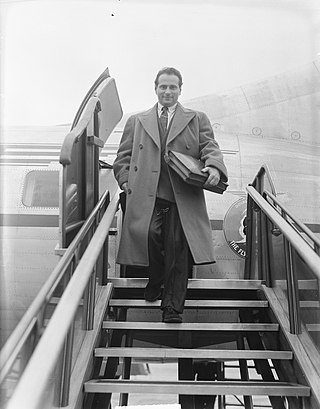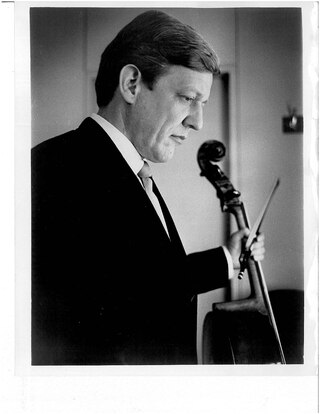
Zara Nelsova (December 23, 1918 –October 10, 2002) was a prominent cellist.

Zara Nelsova (December 23, 1918 –October 10, 2002) was a prominent cellist.
Nelsova was born as Sara Katznelson in Winnipeg, Canada, to parents of Jewish-Russian descent. Nelsova first performed at the age of five in Winnipeg. She eventually moved with her family to London, England, where she studied at the London Cello School with its principal, Herbert Walenn. [1] She was heard by Sir John Barbirolli and introduced by him to Pablo Casals from whom she received additional lessons. In 1932, aged only 13, she gave a London debut recital and appeared as soloist with Sir Malcolm Sargent and the London Symphony Orchestra. During World War II she was principal cellist of the Toronto Symphony Orchestra and in 1942 made her United States solo debut at Town Hall in New York. From 1942 to 1944, she was cellist of the Conservatory String Quartet.
In 1949 Nelsova moved to London, where she introduced to Britain new works by Samuel Barber, Paul Hindemith, Dmitri Shostakovich and Ernest Bloch, who dedicated his three suites for unaccompanied cello to her. She premiered Hugh Wood's concerto at the 1969 Promenade concerts. In 1955 she became an American citizen and performed as a soloist for major orchestras, including Boston, Winnipeg, Montreal and the New York Philharmonic. She also toured extensively, and in 1966 was the first North American cellist to play in the Soviet Union. Nelsova promoted the Elgar Cello Concerto when it was rarely heard, long before Jacqueline du Pré, in concert and in recital with a piano reduction of the orchestral score. From 1966 to 1973 she was married to the American pianist Grant Johannesen, with whom she often performed and recorded. [2] Her dignified, introspective readings of Bloch's Schelomo and Barber's Cello Concerto were both recorded with the composers conducting and later recorded Schelomo under Ernest Ansermet, also for the Decca-London label.)
She played a Stradivari cello, the "Marquis de Corberon" of 1726. She taught at the Juilliard School from 1962 to 2002, the year of her death.
In 2002, Nelsova died in New York City, aged 83. [3]
An award was given in Nelsova's name at the 2008 Naumburg International Violoncello Competition; the winner was Saeunn Thorsteinsdottir, from Iceland. [4] At the 2011 International Cello Festival of Canada an award in her name was presented to Se-Doo Park. [5] [6]

Jacqueline Mary du Pré was a British cellist, considered by many as one of the greatest of all time. Achieving mainstream popularity at a young age, du Pré won Britain's most prestigious cello award at age 11, made her adult debut at 17, and became a fully established artist by 20. At 21, she married the acclaimed conductor and pianist Daniel Barenboim, forming a celebrated musical couple.
Natalie Clein is a British classical cellist. Her mother is a professional violinist. Her sister is the actress Louisa Clein.
Ofra Harnoy is an Israeli-Canadian cellist. She is a Member of the Order of Canada. By joining the international artists roster of RCA Victor Red Seal, Harnoy became the first Canadian classical instrumental soloist since Glenn Gould to gain an exclusive worldwide contract with a major record label. She is a five-time Juno Award winner.

Jan Walter Susskind was a Czech-born British conductor, teacher and pianist. He began his career in his native Prague and travelled to London in March 1939 when Germany invaded Czechoslovakia. He worked for substantial periods in Australia, Canada and the United States, as a conductor and teacher.
The Cello Concerto in B minor, Op. 104, B. 191, is the last solo concerto by Antonín Dvořák. It was written in 1894 for his friend, the cellist Hanuš Wihan, but was premiered in London on March 19, 1896, by the English cellist Leo Stern.

Grant Johannesen was an American pianist.
Sara Sant'Ambrogio is an American cellist best known as a member of the Eroica Trio.
Schelomo: Rhapsodie Hébraïque for Violoncello and Orchestra was the final work of composer Ernest Bloch's Jewish Cycle. Schelomo, which was written in 1915 to 1916, premiered on May 3, 1917, played by cellist Hans Kindler. Artur Bodanzky conducted the concert, which took place in Carnegie Hall. This concert included other works from Bloch's Jewish Cycle, including the premier of Bloch's work the Israel Symphony, which Bloch himself conducted. Three Jewish Tone Poems was also on the concert, but it had premiered two months earlier in Boston.
Steven Honigberg is an American cellist. He is a member of the National Symphony Orchestra and the Potomac String Quartet. From 1994-2002, Honigberg served as chamber music series director at the United States Holocaust Memorial Museum, during which time the museum produced forty concerts and issued 4 CDs. From 1990-2009, he was principal cellist and chamber music director of the Edgar M. Bronfman series in Sun Valley, Idaho, where he was featured as soloist with the summer symphony in a variety of concerti. Hongiberg solos frequently; he is also known as a well-reviewed performer from David Ott's premier of Concerto for Two Cellos.

Nina Kotova is an American cellist of Eastern European descent. As well as being a versatile artist and an established composer she is a recording artist who performs both as a soloist with major orchestras and as a chamber musician.
James Zuill Bailey, better known as Zuill Bailey is an American Grammy Award-winning cello soloist, chamber musician, and artistic director. A graduate of the Peabody Institute of the Johns Hopkins University and the Juilliard School, he has appeared in recital and with major orchestras internationally. He is a professor of cello and Director of the Center for Entrepreneurship at the University of Texas at El Paso. Bailey’s extensive recording catalogue are released on TELARC, Avie, Steinway and Sons, Octave, Delos, Albany, Sono Luminus, Naxos, Azica, Concord, EuroArts, ASV, Oxingale and Zenph Studios.

Alisa Weilerstein is an American classical cellist. She was named a 2011 MacArthur Fellow.
Georges Miquelle was born in Lille, France. He was a classical cellist in France and the United States.

Felix Adrian Norman Salmond was an English cellist and cello teacher who achieved success in the UK and the US.

Lorne Munroe was an American cellist. He was principal cellist of the Philadelphia Orchestra from 1951 to 1964 and principal cellist of the New York Philharmonic from 1964 to 1996. He was a featured soloist more than 150 times during the 32 seasons he played for the New York Philharmonic. His last performance with the orchestra as a member of the ensemble was on February 27, 1996; although he later returned as a guest artist.
The Russian-born British/German cellist Leonid Gorokhov studied at the St. Petersburg Conservatoire with Anatoli Nikitin and took part in masterclasses with Daniil Shafran. Winner of Concertino Praga and Paris Chamber Music Competition, Leonid Gorokhov is the only Russian cellist to be awarded the Grand Prix and the First Prize of the Geneva Concours (1986). In 1995 the European Association for Encouragement of the Arts awarded the Cultural Achievement Prize to Leonid Gorokhov for exceptional talent and outstanding artistic accomplishment.
Maurice Eisenberg was a cellist, both performer and teacher.

Li-Wei Qin is a Chinese-Australian cellist. He won the Silver Medal at the 11th International Tchaikovsky Competition in 1998, and First Prize at the 2001 International Naumburg Competition in New York.
Gisela Depkat is a Canadian cellist and teacher. She has won multiple prizes at several international competitions and has performed as soloist with many symphony orchestras. Depkat has taught at the University of Texas at Austin, at Wilfrid Laurier University, McGill University and the University of Ottawa. She was principal cello of the Calgary Philharmonic Orchestra and the Kitchener-Waterloo Symphony Orchestra and was a private teacher at a summer children's camp and worked for two music institutions in the mid-1980s.
Elgar Concerto: Recital, Eaton Auditorium, Toronto, ca 1955.